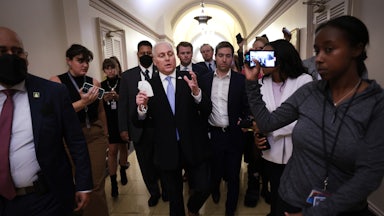The chaos in the House of Representatives continued on Thursday, as Republican representatives almost seemed to want to outdo the dysfunction of the beginning of the week. After losing two roll-call votes on the House floor, Representative Jim Jordan briefly endorsed empowering Speaker Pro Tempore Patrick McHenry to take the reins, a move that would allow the House to function normally and consider legislation. But Republicans emerged from a fraught three-and-a-half-hour meeting insisting that such a resolution could not pass without garnering Democratic votes—a cardinal sin among the party faithful. With more than 20 holdouts remaining, Jordan vowed to hold another vote, which only provided another opportunity for his bid to once again be shot down on the House floor.
Despite earning support from the majority of his party, Jordan’s candidacy for the speakership was imperiled by familiar foes: his fellow Republicans. This was an echo of January’s intraparty strife, which saw former Speaker Kevin McCarthy endure 15 rounds of voting before he was elected.
But there was a plot twist in Jordan’s sequel: McCarthy’s opponents in January were hard-right lawmakers seeking concessions. Jordan’s holdouts, on the other hand, fit a much different mold—an ideologically diverse group of Republicans with a yen for institutionalism. That this coterie of lawmakers formed a core of resistance to Jordan’s bid raises questions about which members of the Republican coalition will emerge from the fracas as more empowered, and whether—after months and even years of concessions to the party’s far right—GOP lawmakers who care about governance are finally striking back. “The level of opposition is profound,” Representative Steve Womack, one of Jordan’s opponents, told reporters on Wednesday.
There may be an instinct to call the Jordan skeptics “moderates,” but that doesn’t accurately represent the breadth of his opposition. Six of the Jordan holdouts represent districts that President Joe Biden won in 2020, but others are in safe Republican seats; four even opposed certifying the 2020 election.
Although some are members of the bipartisan Problem Solvers Caucus—typically an indicator of ideological centrism—there are many others who could be considered true conservatives. Moreover, not all of the dyed-in-the-wool moderates followed suit in opposing Jordan. Some, such as Problem Solvers Caucus co-chair Representative Brian Fitzpatrick, supported Jordan in the first two votes. Fitzpatrick’s vote for Jordan was a signal that the institution needed to get back to work, he told me: “This is solely a matter of the fact that our government is completely offline right now in the legislative branch.” Ideological moderation was not an indication of support for Jordan—or lack thereof—so much as getting the government back on track.
Then there is another noteworthy hive of opposition to Jordan: the appropriators. Several of the holdouts, such as Womack, are longtime members of the House Appropriations Committee who appreciate the need to work with Democrats on government spending bills. Representative Kay Granger, the chair of the Appropriations Committee, was among those who voted against Jordan.
Finally, there are some who just take it personally. Some Republican lawmakers are simply fed up with Jordan’s approach to governing, and disgusted by efforts of his allies to bully holdouts into conceding support.
“One part wants to get things done, another part [is] sick of having other people break things,” Brendan Buck, a Republican strategist and former aide to Speakers Paul Ryan and John Boehner, said about the Jordan holdouts. “I think it basically just comes down to people who want to get some stuff done every once in a while, and are sick of being screwed with.”
Indeed, the diversity in opposition to Jordan—based on ideology and personality—could contribute to his difficulties in uniting Republicans behind one candidate. “Before we can solve a problem, we have to define it. And I think that’s the issue that we’ve had, that [with] the breadth and the depth of the emotion going on here, it’s very, very challenging to find that solution,” Representative Glenn Thompson told me. “At this point, where we’re at, everybody is losing.”
Jordan, a co-founder of the Freedom Caucus, has a well-earned reputation as a bomb-throwing rabble-rouser with few if any relationships with members on the other side of the aisle. Although he became a key ally of McCarthy, many Republicans still remember when he was a thorn in Boehner’s side and the role he played in pushing Boehner to resign. (Boehner famously referred to his fellow Ohioan as “a legislative terrorist.”) Some allies of Majority Leader Steve Scalise, who dropped out of the speaker’s race last week, also blame Jordan for undermining Scalise’s bid.
“They’ve seen the history, they’ve been impacted over the last decade. So you’ve got that crowd,” said Representative Don Bacon, one of Jordan’s opponents. “Many of us were angered by the actions of his supporters since January.… They took down McCarthy, and they took down Scalise.”
Representative Dan Crenshaw, a Republican who supported Jordan, compared the anti-Jordan faction to the “hard-liners” who stymied McCarthy in January. “The hard-liners, for the most part, aren’t any more conservative than the so-called ‘moderates.’ They’re just angrier, and more willing to use tactics that are based in emotion,” Crenshaw said. People usually use the word “moderate,” he continued, to describe lawmakers who are more “willing to govern.”
Still, it might not be accurate to characterize Jordan opponents uniformly as pure institutionalists. Indeed, one of the most vocal of the anti-Jordan crew, Representative Ken Buck, said that he should not be considered an “institutionalist”; he was one of the eight who voted to oust McCarthy in September. “I think there is a broad spectrum of support for Jim, and I think there’s a broad spectrum of opposition. I don’t think you can cubbyhole either side,” Buck said, adding that he considers himself a “Reagan Republican.”
The other holdouts included some senior appropriators but also several Republicans from New York in swing districts, loyalists to McCarthy, and lawmakers who opposed Jordan’s support for former President Donald Trump’s efforts to overturn the 2020 election. Womack noted that the groundswell against Jordan was “organic,” with support from different members across the ideological spectrum and the country.
There also wasn’t much in the way of unity when it came to determining an alternative speaker candidate in the first two votes: Instead, some of Jordan’s opponents cast votes for mainstream candidates such as McCarthy and Scalise, but others cast further afield for more outré names, like former Speaker John Boehner and former Representatives Lee Zeldin and Candice Miller.
Others became entrenched in their never-Jordan position because of the pressure campaign waged by Jordan allies, including right-wing media figures. Womack told me that he opposed Jordan in part because “I just think that there are better options for us to be able to make the country work, make this government work.” But he also said that he had been frustrated by his experience of the past few days, as Jordan allies have harassed the remaining holdouts. Some Jordan opponents have even received death threats, although Jordan has condemned these tactics.
“I’m a retired colonel. I wore that uniform for 30 years, five months, and 19 days. I didn’t lead troops because I was a sissy, or that I could be pushed over, or that I would be willing to change my closely held beliefs,” Womack told me on Wednesday. “If what I’m doing is such that it causes me to have to go home because my electorate doesn’t like my position, I will go home head high, with my dignity.”
Brendan Buck, the GOP strategist, noted that much of the opposition to Jordan could be personal. “He has been the ringleader of so much of the dysfunction and so much of the sabotage that’s gone on for the last 10 years,” Buck said. “He is as much as anybody the avatar for conservative meddling, and people see that very clearly.”
The tendency to identify ideological conservatives as “moderate” echoes former President Donald Trump’s denunciation of certain Republicans as “RINOs”—Republicans in Name Only. For Trump, the term RINO would be bandied about in retaliation for perceived disloyalty. The problem with using the terms “moderate” or “conservative” in the modern era of the Republican Party, said Sarah Longwell, a Republican strategist who opposes Trump, is that those terms are no longer applicable, because they are defined solely in relation to the former president.
“The new reality is that Donald Trump has ceased to make these words meaningful,” said Longwell. “When people talk now, they say someone’s ‘hard right’ or ‘hard-core conservative’ as a stand-in for [being] a big supporter of Donald Trump.”
Longwell suggested instead using terms like “MAGA establishment” to refer to politicians like McCarthy, “the pure unrestrained id of MAGA’’ for bomb throwers like Jordan or Representative Matt Gaetz, and then the “normies’’ who “still believe governing should take place.” These are apt dividing lines for a Republican Party in the throes of a slow-motion schism.
But Buck argued that the imprecise nature of the term “moderate” had less to do with Trump than with a growing GOP aversion to compromise. “It has become such an intolerable act to consider working with the other party that it’s a fireable offense, as Kevin McCarthy came to find out,” Buck said. McCarthy’s support for passing a stopgap measure to keep the government funded temporarily was the precipitating factor in his removal.
Echoing that worry, Fitzpatrick, the co-chair of the bipartisan Problem Solvers Caucus who supported Jordan for the first two ballots, argued that the “eight and 208”—referring to the eight Republicans who voted to oust McCarthy, along with all Democrats—had sent the message that they will “punish, not reward, bipartisanship.” “Quite frankly, people that run for leadership tend to be more partisan, much to my chagrin,” Fitzpatrick told me on Thursday morning.
Representative Mario Diaz-Balart, another Republican who opposed Jordan, shied away from the idea that certain members might feel more empowered after the events of the past two weeks.
“I don’t like where we are. So it’s not like I feel like some people are more powerful, and some are not,” Diaz-Balart said. “What I do think you have is a group of folks who have been very clear about where they stand, and are standing for what they believe in, and I think that’s a positive thing.”
It’s unclear whether the opposition to Jordan is a blip on the radar or an indication of larger frustration with the bomb throwers in the GOP. It’s also uncertain whether any particular faction can emerge empowered from such a divisive moment for the party.
“Anybody who is feeling emboldened through this fiasco is self-centered to a degree that is hard to comprehend,” Representative Dusty Johnson told me. “Nothing about this is good for our country.”










